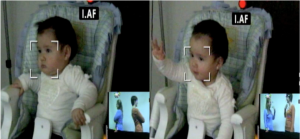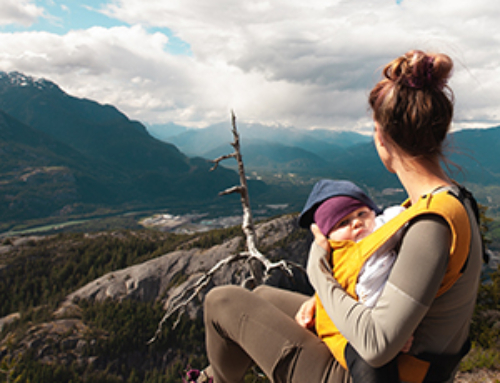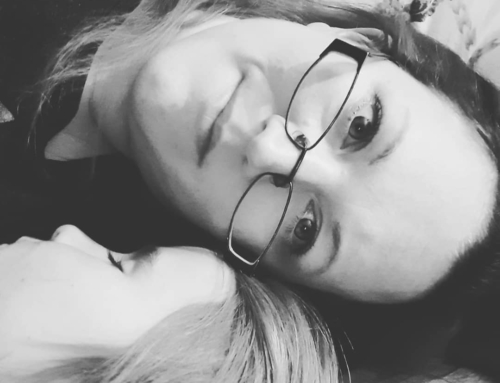By Varda Meyers Epstein
 Would you do or say things in the presence of your baby that you’d never do or say around your best friend? When is a baby old enough to understand a marital spat or an intimate discussion between parents? At what age does your infant morph from a cute and cuddly bundle to the third person in the room; the onlooker who forces you to defer certain conversational topics to a later time when you and your spouse are alone?
Would you do or say things in the presence of your baby that you’d never do or say around your best friend? When is a baby old enough to understand a marital spat or an intimate discussion between parents? At what age does your infant morph from a cute and cuddly bundle to the third person in the room; the onlooker who forces you to defer certain conversational topics to a later time when you and your spouse are alone?
As it turns out, babies pick up on certain social cues even before they can talk. They know, for instance, from observing certain behaviors whether or not an individual is a friend. This is according to a recent study on infant cognition by University of Chicago researchers.
This research gives us new insight on when human beings first gain social awareness. The study results suggest that infants as young as nine-months-old can reason as to whether people are friends or foes based on observing their likes and dislikes. The name of the study, published in the Journal of Experimental Psychology: General, is “Friends or Foes: Infants Use Shared Evaluations to Infer Others’ Social Relationships.”
Lead author of the study is Zoe Liberman, a doctoral student at the University of Chicago’s Department of Psychology, who collaborated with co-authors Amanda L. Woodward; the William S. Gray Professor of Psychology at the University of Chicago, and Katherine D. Kinzler; Neubauer, Family Assistant Professor of Psychology at the University of Chicago. The study subjects included 64 nine-month-old infants. The infants were randomly placed in groups and were shown videos of two adults.
“Salient Social Information”
Each adult ate two foods, reacting in a positive or negative fashion to each food item eaten. In some of the videos, the adults displayed the same reactions to a food while in others one had a negative and one a positive reaction to the food in question. Kinzler explains that food can offer “salient social information” because dining with others tends to be a social experience. The researchers began with the hunch that infants are likely to use eating experiences as a means to understanding social relationships.
To find out whether this assumption was true, the researchers kept watch on the infants’ response to each video, which depicted the same two adults acting in a positive or negative fashion toward each other. A positive interaction showed adults greeting each other with smiles while saying “Hi!” in friendly tones. A negative reaction was shown by having the adults in the video turn away from each other while crossing their arms and saying, “Hmph!” in an unfriendly voice.
The reactions of the infants to the videos were measured by how much time the babies stared at paused still shots at the conclusion of each video. Previous research, according to Woodward, has already demonstrated that babies watch things longer when they come across something unexpected. It’s an attempt to make sense of something that doesn’t seem to fit. This known phenomenon offered a way for trained researchers to code the gazing behavior of the infants in reaction to each video.
Surprised Reactions
The researchers found that the babies were surprised when adults that reacted positively to foods reacted negatively to each other. The infants also expressed surprise when adults that disagreed on whether or not they liked a food, behaved as friends.
The study suggests that as early as nine months, infants know that when adults express agreement, they are likely to be friends in other contexts. The infants thought that people who liked the same foods would tend to be friends and were taken aback when a video told a different story.
According to Liberman, the study offers us intriguing information on how babies reason when sizing up those in their social spheres. Babies are watching and making inferences about the social interactions they see. “Our data suggests that even with relatively little experience, and typically no explicit training or instruction; infants are already monitoring their surroundings and picking up on cues that may be important for thinking about other people’s relationships,” said Liberman. “Our work opens many interesting and new questions about how infants understand and navigate their social world.
“We are also interested in how food may provide particularly informative social information. So, future studies will also ask about
As for marital spats in front of the little one, parents may want to consider the fact that a disagreement may not be something to hide from baby—as long as baby gets to witness the quarrel’s resolution. This is an important lesson for baby: it’s okay for people to disagree. Adults can discuss issues while maintaining tolerance and respect for the opposite viewpoint and without screaming and verbal abuse.
Brussels sprouts, anyone?
Resource: University of Chicago. “Infants show ability to tell friends from foes.”
Varda Meyers Epstein is a mother of 12 and a communications writer at Kars4Kids where she also blogs about education at the Kars4Kids blog: http://www.kars4kids.org/blog.
[Image Credit: Zoe Liberman, used with permission, must contact author to reuse]






Tracy, this was fascinating.
I wonder if a caregiver’s reactive style to other things influences how a baby makes predictions about the social world.
I’m thinking of reactions to various kinds of music, people of varied backgrounds, even certain buildings and settings.
What do you think?
What do you mean about how the caregiver’s reactive style to other things? What are you imagining?
Hi Ekanem,
The researchers hope to explore what other activities might trigger this sort of social analysis by infants, in addition to eating. Eating was a no-brainer. But there are likely other social situations that elicit this type of response. It will take time and experimenting to figure it out.
Once my husband and I were having one of these play fights and it was only when my baby looked from me to him and back again with wide-open eyes and a rather shocked look on her face that I realized that she may just be too old for us to do this in front of her anymore…
Great piece, Varda and thanks Tracy for posting.
I guess you’ll know your baby’s really matured when she gets that a play fight is playful! Glad you enjoyed, Wendy. Thanks for reading and commenting.
[…] educational initiatives for children. In addition to writing blog pieces here, there, and everywhere, Varda is editor of the Kars4Kids educational blog for […]
[…] educational initiatives for children. In addition to writing blog pieces here, there, and everywhere, Varda is editor of the Kars4Kids educational blog for […]
[…] educational initiatives for children. In addition to writing blog pieces here, there, and everywhere, Varda is editor of the Kars4Kids educational blog for […]
[…] educational initiatives for children. In addition to writing blog pieces here, there, and everywhere, Varda is editor of the Kars4Kids educational blog for […]